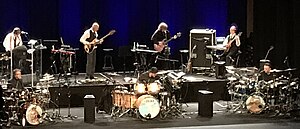
Back كينج كريمسون (فريق روك) Arabic King Crimson Azerbaijani کینق کریمسون AZB Кинг Кримсън Bulgarian King Crimson BS King Crimson Catalan King Crimson Czech King Crimson Danish King Crimson German King Crimson Greek
King Crimson | |
|---|---|
 King Crimson in Nijmegen on 22 June 2019. Top L–R: Mel Collins, Tony Levin, Jakko Jakszyk, Robert Fripp. Bottom L–R: Pat Mastelotto, Jeremy Stacey, and Gavin Harrison. | |
| Background information | |
| Origin | London, England |
| Genres | |
| Discography | King Crimson discography |
| Years active |
|
| Labels | |
| Spinoffs | |
| Spinoff of | |
| Past members | |
| Website | dgmlive |
King Crimson were an English-based progressive rock band formed in London in 1968. Led by guitarist Robert Fripp,[1][2] they drew inspiration from a wide variety of music, incorporating elements of classical, jazz, folk, heavy metal, gamelan, blues, industrial, electronic, experimental music and new wave. They exerted a strong influence on the early 1970s progressive rock movement, including on contemporaries such as Yes and Genesis, and continue to inspire subsequent generations of artists across multiple genres.[3] The band has earned a large cult following, especially in the 21st century.[4][5]
Founded by Fripp, Michael Giles, Greg Lake, Ian McDonald and Peter Sinfield, the band's debut album, In the Court of the Crimson King (1969), remains their most commercially successful and influential release.[6] The next two albums, In the Wake of Poseidon and Lizard (both 1970), were recorded during a period of instability in the band's line-up, before a settled line-up of Fripp, Sinfield, Mel Collins, Boz Burrell and Ian Wallace recorded Islands in 1971. In mid-1972, Fripp disbanded this line-up, recruited new members Bill Bruford (formerly of Yes), John Wetton, David Cross and Jamie Muir, and changed the group's musical approach, drawing from European free improvisation and developing ever more complex compositions. The band reached what some saw as a creative peak on Larks' Tongues in Aspic (1973), Starless and Bible Black (1974), and Red (1974). King Crimson disbanded at the end of 1974.
After seven years of inactivity, King Crimson was recreated in 1981 with Fripp, Bruford and new members Adrian Belew (previously a side man for Frank Zappa, David Bowie, and Talking Heads) and Tony Levin (already a prolific session musician for numerous top artists, including John Lennon and Peter Gabriel). Drawing influence from African music, gamelan, post-punk and New York minimalism, this band lasted three years, resulting in the trio of albums Discipline (1981), Beat (1982) and Three of a Perfect Pair (1984). Following a decade-long hiatus, they reformed in 1994, adding Pat Mastelotto and Trey Gunn for a sextet line-up Fripp called "The Double Trio". The double trio participated in another three-year cycle of activity that included the album Thrak (1995). Fripp, Belew, Mastelotto and Gunn reunited in 2000 as a quartet,[7] called "The Double Duo", releasing The Construkction of Light (2000) and The Power to Believe (2003). After another hiatus, the band reformed for a 2008 tour celebrating the 40th anniversary of their 1968 formation, with Gavin Harrison of Porcupine Tree being added, and Levin returning in place of Gunn.
Following another hiatus (2009–2012), during which Fripp was thought to be retired, King Crimson came together again in 2013, this time as a septet (and, later, octet) with an unusual three-drumkit frontline, and new singer and secondary guitarist Jakko Jakszyk. This version of King Crimson toured from 2014 to 2021. After the band's final show in 2021, Fripp commented that King Crimson had "moved from sound to silence."[8]
- ^ Meagher, John (1 April 2023). "King Crimson: how a new film captures Robert Fripp's eccentric reign". Irish Independent. Retrieved 20 June 2024.
Jazz, experimental rock, metal, math-rock, industrial: under their perfectionist leader Robert Fripp, the band have pushed boundaries like few others. They are still doing so, yet the prog rock tag continues to dog them.
- ^ Pareles, Jon (19 September 2022). "Robert Fripp Lightens Up". The New York Times. ISSN 0362-4331. Retrieved 20 June 2024.
As the guitarist and leader of King Crimson — the band he founded in 1969 — Fripp, 76, has written music that's barbed, visceral, complex and ambitious, seizing the vanguard of progressive rock yet reaching a broad audience.
- ^ Cite error: The named reference
rollingstone schizoidwas invoked but never defined (see the help page). - ^ Cite error: The named reference
fanaticswas invoked but never defined (see the help page). - ^ Shteamer, Hank (15 April 2019). "The Crimson King Seeks a New Court". Rolling Stone. Archived from the original on 26 October 2021. Retrieved 19 March 2021.
- ^ Buckley 2003, p. 477, "Opening with the cataclysmic heavy-metal of "21st Century Schizoid Man", and closing with the cathedral-sized title track,"
- ^ Freeman, Phil (10 October 2019). "A Tribute To In The Court Of The Crimson King, Released 50 Years Ago Today". stereogum.com. Archived from the original on 7 February 2021. Retrieved 7 February 2021.
- ^ Colothan, Scott (8 December 2021). "Robert Fripp says King Crimson have 'moved from sound to silence'". Planet Rock. H Bauer Publishin. Retrieved 26 June 2024.